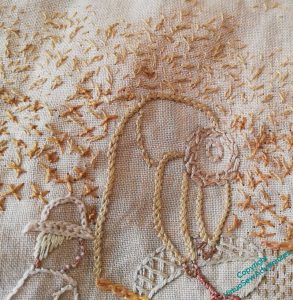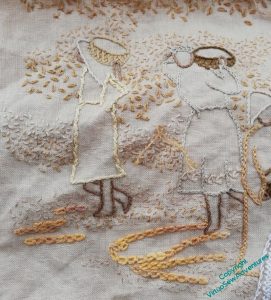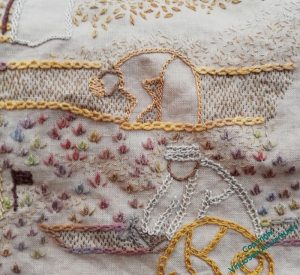Continuing to bring the View forward
I decided to continue to use Danish Knot Stitch across this area. It makes for a lot of raggedy and flyaway texture, which I think works quite successfully. Furthermore, even if my original idea for these panels was that they would be viewed from a distance, I have learned over the past twenty years that embroideries pull people in. There needs to be something interesting for everyone therefore – the big story, what you see from a distance; the small stories told by the patches; and the details and flourishes added in the working, which may not be appreciated by everyone (although in my experience, anyone who’s willing to pay attention can be enticed into our world!), but which will certainly add something for those deeply interested.
As I continue to work forward, however, I’m not using exclusively heavier and more textured stitches. My starting point is still pale seed stitches. These help to pull the whole thing together (I hope!) and give me a first layer of texture. That’s the dust underfoot and in the air, the “yellow cloud of dust” referred to in the text. The heavier and darker stitching is what pulls the figures forward, responding to the heavier and stronger stitches used to outline them. Then tiny, pale stitches will sparkle through and change the texture again.
Even as I come right into the foreground, I’m starting with seed stitches. I think they won’t go across the whole of the area with the tête de boeuf stitches, as I want to make sure that those stitches keep their authority. I will, however, have to do something about the edge you can see on the right of the topmost trench in that picture, maybe more tête de boeuf stitches, maybe more trench. Wait and see!




This is shaping up very nicely. I agree about giving the viewer a reward for taking a closer look. It does add a lot to their enjoyment of the piece. I am looking forward to seeing the whole thing, now I have seen the new work close-up – the ploy works both ways!
Fascinating to see the process in action.
Loving the details.
It is a slow process but that is part of the appeal of stitching original piece.
This is working so well. xx
“I have learned over the past twenty years that embroideries pull people in. There needs to be something interesting for everyone therefore – the big story, what you see from a distance; the small stories told by the patches; and the details and flourishes added in the working, which may not be appreciated by everyone (although in my experience, anyone who’s willing to pay attention can be enticed into our world!), but which will certainly add something for those deeply interested.”
Yes! Yes!! Yes!!! to everything you’ve said here. The pull of embroidery perfectly put. (Try saying that after a large G&T!)
I like the variation in stitch heaviness, which you’ve explained well. This is a very appealing piece of stitchery, both for those variations, and for the colors you chose. Embroidery does pull people in. Many of my friends can’t believe I do it by hand, not by machine, but it’s the satisfaction of creating by hand that appeals to me.